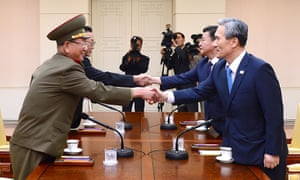North and South Korea have agreed to a second round of talks after marathon, night-long negotiations fell short of resolving a crisis that has pushed them to the brink of armed conflict.
The two sides called a recess in the early hours of the morning after nearly 10 hours of discussions and agreed to meet again at 3pm (6am GMT) on Sunday to “narrow down differences”, said South Korea’s presidential spokesman, Min Kyung-wook.
The talks in the border truce village of Panmunjom had begun early on Saturday evening, shortly after a North Korean deadline expired for Seoul to halt loudspeaker propaganda broadcasts across the border or face military action.
Despite scepticism that Pyongyang would follow through on its threat, the ultimatum raised border tensions to their highest level for years, with the North repositioning artillery units and South Korean and US fighter jets flying simulated bombing runs.
Thousands of South Korean civilians living on front-line border islands or near military propaganda units were evacuated from their homes to underground shelters as a preventive measure.
The negotiations in Panmunjom, where the 1950-53 Korean war ceasefire was signed, were led by South Korean national security adviser Kim Kwan-jin and his North Korean counterpart Hwang Pyong-so – a close confidante of leader Kim Jong-un.
They were the highest-level inter-Korean talks for nearly a year – a reflection of the seriousness of the situation.
“The two sides had wide discussions on ways to settle the recently developed situation and to improve inter-Korean relations down the road,” Min said.
Analysts had predicted it would be difficult to find a compromise where neither side lost face, especially given the specific nature of the demands on both sides.
Seoul has refused to turn off the loudspeaker broadcasts until Pyongyang apologises for mine blasts this month that maimed two South Korean soldiers on border patrol.
North Korea denies any responsibility for the explosions and has accused the South of fabricating evidence of its involvement.
“It’s obviously been tough, but the fact that they have agreed to meet again is good news,” said Yang Moo-jin, a professor at the University of North Korean Studies in Seoul.
“Even more encouraging is that they discussed not only ways to extricate themselves from the current crisis, but also ways to develop inter-Korean relations in the future,” Yang said.
South Korea said the initial request for talks had come from the North, despite its aggressive rhetoric and military posturing of recent days.
On the orders of Kim Jong-un, the North Korean People’s Army (KPA) has been in a “fully armed, wartime state” since Friday, while the foreign ministry in Pyongyang warned Saturday that the situation had “reached the brink of war” and was “hardly controllable”.
Until now, there has been little sense of panic among ordinary South Koreans who have become largely inured over the years to the North’s regular – and regularly unrealised – threats of imminent war.
Technically, the two Koreas have been at war for the past 65 years, as the war ended with a ceasefire that was never ratified by a formal peace treaty.
Kim Jong-un’s order to move to a war footing came after an exchange of artillery fire on Thursday that claimed no casualties but triggered a dangerous spike in cross-border tensions.
On Friday, South Korean president Park Geun-hye appeared on television, wearing army fatigues and telling top military commanders that further North Korean provocations “will not be tolerated”.
The situation is being closely watched, with UN chief Ban Ki-moon calling for restraint from both sides and the United States urging Pyongyang to avoid further escalation.
There are nearly 30,000 US troops permanently stationed in South Korea, and the US military’s top officer on Saturday reiterated Washington’s commitment to the defence of its ally.
Calls for calm and restraint have also come from China, the North’s main diplomatic protector and economic supporter.
www.theguardian.com/world/2015/aug/22/south-and-north-korea-adjourn-talks-after-night-long-session-fails-to-end-crisis




